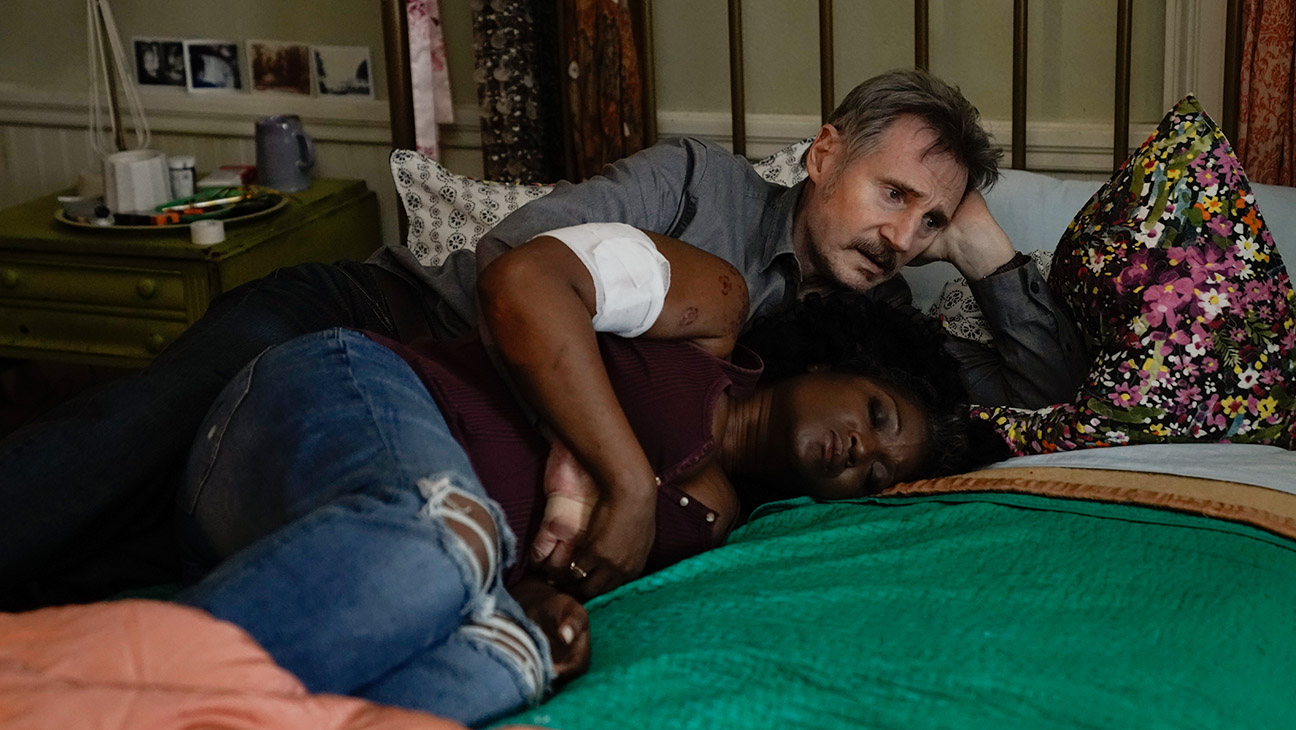Ever since 2008’s Taken opened up a surprisingly durable late-career reinvention for Liam Neeson as a taciturn action star of tough-guy dad thrillers, frequently dispatching lowlifes who mess with his family, it’s become the norm to expect more of the same. Especially from an entry with a blunt one-word title like Absolution. This latest variation on the formula has those key ingredients, but the relatively few bursts of violence are tempered by a melancholic undertow, and the ticking clock this time is an internal one in the protagonist, identified only in the credits as “Thug.”
As the job title suggests, this is another movie in which Neeson takes a break from playing a retired government agent or cop or Marine to cross over into the criminal world. The damage done to his kids here stems from his own dereliction of parental duties.
Absolution
The Bottom Line
Neither the best nor the worst of Neeson’s action era.
Release date: Friday, Nov. 1
Cast: Liam Neeson, Yolonda Ross, Frankie Shaw, Ron Perlman, Daniel Diemer, Javier Molina, Terrence Pulliam
Director: Hans Petter Moland
Screenwriter: Tony Gayton
Rated R,
1 hour 52 minutes
As in 2022’s unmemorable Memory, in which the actor portrayed a contract killer dealing with early-onset Alzheimer’s, Neeson plays a man facing rapidly diminishing faculties. A former boxer who has spent the last 30 years as an enforcer, collecting payments and doing pickups and deliveries for a Boston gangster, Thug is diagnosed with an advanced case of Chronic Traumatic Encephalopathy — an untreatable neurodegenerative disease resulting from a lifetime of concussions that started around age six, probably at the hand of his father.
That leaves him limited time to grapple with his mortality, take an honest look at his many mistakes in life and make amends with his estranged daughter, Daisy (Frankie Shaw). That also means trying to get to know Dre (Terrence Pulliam), the preteen grandson he has never even met.
The ruminative redemption thriller reunites Neeson with Norwegian director Hans Petter Moland, with whom he worked on the 2019 remake, Cold Pursuit, playing a Colorado snowplow driver who sets out to avenge the murder of his son by a Denver drug cartel. That movie was a mixed bag — watchable but no match for Moland’s own homeland original, In Order of Disappearance, a terrific Stellan Skarsgard vehicle that more effectively nailed the blend of tragedy, bloody violence and mordant humor.
Using many of the same key collaborators from that 2014 film — notably DP Philip Ogaard, production designer Jorgen Stangebye Larsen and composer Kaspar Kaae — Moland delivers a sharp-looking, well-paced movie with a moody score.
Absolution remains gripping even if Tony Gayton’s screenplay doesn’t always avoid cliché and contrivance, particularly in a final act that stretches to cover too much ground. On the plus side, the director’s Nordic sensibility means he spends a pleasing amount of time on milieu and character development and has little use for sentimentality, lending the material soulfulness and psychological depth that get you invested in the solitary protagonist.
Thug lives in a Newton, Massachusetts, neighborhood that still shows its blue-collar roots. He works for Boston underworld figure Charlie Conner (Ron Perlman), who maintains a respectable front with a chain of furniture factory outlets. (Perlman is playing a more serious version of the same character he played in the instantly forgotten Apple TV+ heist caper, The Instigators, again with a big fat safe in his office full of dirty money, although in that film he was a corrupt Beantown mayor.)
While Thug has learned never to ask questions about whatever goods he’s carrying, he gets partnered on jobs with Conner’s mouthy cokehead son Kyle (Daniel Diemer), who’s curious and dumb enough to make him a liability. Cocky and impatient to learn the business so he can prove his worth to his father, the kid chafes at the veteran’s brusque career guidance, which leads to messy repercussions down the line.
Thug falls into a half-hearted romance with a similarly unnamed character credited as Woman (Yolonda Ross), after knocking out her abusive boyfriend with a single punch in a local bar. She’s younger, but not so much that the relationship is implausible, and she has her own troubled history. She’s warm and funny and drawn to him, not scared off by his gruff side or his reluctance to show tenderness.
When Thug’s lapses of memory become impossible to ignore — he forgets names and addresses at first, then more significant things as his illness progresses — he sees a neurologist who gives him two years at most before he will become unable to care for himself. He’s about to blow his brains out in the car immediately after, until the face of a child in another car changes his mind.
From that point on, Gayton’s screenplay splits its focus between Thug’s criminal activities — including a drop-off where he witnesses what looks like disturbing signs of sex trafficking that will haunt him — and his efforts to reconnect with his daughter.
With his son out of the picture for reasons he’s shocked to learn, Daisy and Dre are all the family he has left. She wants nothing to do with him at first, too hard-bitten by his abandonment to trust him again. But he inches back into their lives and sparks the tentative beginnings of a bond with his grandson.
As soon as you learn that Daisy and Dre are being kicked out of the rental she can barely afford, you know where the story is headed. But that doesn’t make it any less involving when Thug begins planning to put things right, even as his mental health deteriorates precipitously and another, more violent threat to his life emerges. Having very little left to lose, he makes desperate snap decisions to get what he needs and take some of the load off his conscience.
Neeson brings his usual gravitas and towering physicality to the role, plus a whole heap of anger, pain, regret and an excellent mustache. He has strong support from Ross as a woman who is both nurturing and considerably more fragile than she at first appears; from Shaw, tough as nails and reluctant to forgive, but not without a heart; and from Pulliam in some lovely interludes in which you feel the unspoken longing between them — one for some semblance of a father figure, the other for a son with whom he can break the chain of brutality that began with his own late father.
The film’s clunkiest missteps are vivid dream sequences out on the water on a fishing boat that was the one good thing in his childhood, the old man (Josh Drennan) locking a hostile gaze on him from alongside the outboard motor. These scenes spell out too much obvious stuff about the pattern of unfeeling masculinity that shapes boys into harsh men, toughening them up supposedly for their own good. The movie is best in its more measured scenes.
It’s not up there with The Grey, the 2012 survival thriller in which Neeson faced off against a pack of wolves in the Alaskan wilderness (for my money, the best of his post-Taken canon). But Absolution is solid mid-tier B-movie entertainment with some unexpected emotional substance.
There’s poignancy in the character study of a career criminal who has aged out of his line of work, an aspect a surly drug dealer (Javier Molina) feels the need to remind him of by addressing him as “Jurassic” or “viejo.” He’s a beat-up relic, just like the faded red ’70s Chevrolet Sport Sedan he drives. If, as he has hinted in interviews, Neeson is thinking about bowing out of the bruising roles that made him an action star in his late 50s, it’s good to see him signing off in a reflective mode, while still able to take out a few bad guys.








